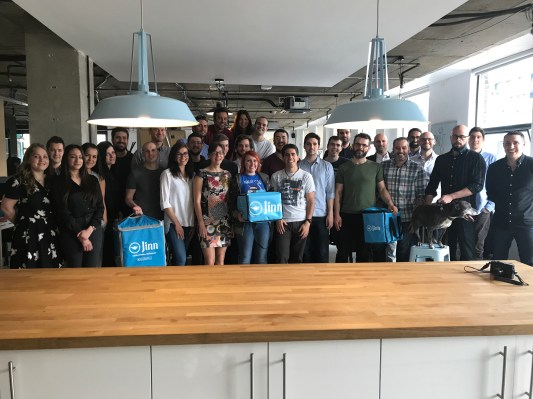Jinn, the London-based startup that offers a same-hour ‘shop on your behalf’ delivery app that operates quite similarly to Postmates in the U.S., has shut down, with the company in the process of going into administration. TechCrunch understands that the remaining fifteen or so people still working in Jinn’s London office were let go on Tuesday, while, according to a source, payments to freelance delivery drivers and other staff are outstanding.
Founder and CEO of Jinn Mario Navarro confirmed that the startup has entered the deadpool, and issued the following statement:
“To our employees, couriers, partners and customers,
It is with a heavy heart that I share that Jinn has now stopped operating and won’t be taking any new orders.
These past few months, we have tried through all means to find solutions to keep Jinn alive. Unfortunately, we have now run out of time and we will be filing for administration. We deeply apologise to everyone who relied on Jinn in any way.
To our employees, I’d like to thank you for everything that you’ve done in these past four years. You have helped develop a platform capable of delivering orders from any store or restaurant in around thirty minutes, a first of its kind in the United Kingdom. You have helped make this service known to over a hundred thousand customers, who have received over a million deliveries. You have supported these customers and thousands of couriers and partners across these years. Your achievements have been nothing short of extraordinary and the fact that Jinn is closing does not change that.
To our couriers, partners and customers, thank you for being part of a great community and for accelerating innovation in the on-demand delivery space. Together, we have greatly improved the standards of this market, and it is stronger than ever thanks to you. We encourage you to continue working with the different companies providing solutions for on-demand delivery in the UK. I’m confident that this market will continue to grow and I’m hopeful for the future.
Mario”
Meanwhile, Business Insider is reporting that Jinn — which to varying degrees competes with Deliveroo, UberEATS, and Quiqup — had met with three rival food delivery businesses earlier this month about a potential acquisition deal, but in the end ran out of time to be able to make a sale possible.
However, my understanding is that the company began shopping itself around as early as this Summer, but with administration looking increasingly likely, accelerated efforts to find a buyer in the last week.
I also understand that the administrator Moorfields has been appointed and will now be tasked with finding an acquirer for any of Jinn’s remaining assets, namely the software platform that powered the ordering and dispatching functionality of the delivery service.
A member of Moorfields’ team confirmed that couriers working for Jinn are owed money. In a message sent by Jinn to its fleet of drivers (and seen by TechCrunch) they are advised that if they are owed any money, they will be contacted by the administrator in the coming days who will “deal with your situation on a case by case basis”.
The shuttering of Jinn comes after a turbulent time for the startup over the last year. In May, the company announced that it had raised $10 million in further funding. That, in theory, brought total raised by Jinn to a modest $20 million in comparison to other players in the on-demand delivery space. However, it isn’t clear that the full $10 million entered the startup’s balance sheet and was likely contingent on milestones and delivered in tranches, a key detail that will hopefully be made public in any postmortem of the company’s shuttering.
This was followed just two months later with news that Jinn had pulled out of all markets outside London, “pausing” operations in Edinburgh, Glasgow, Manchester, Birmingham and Leeds in the U.K., and Madrid and Barcelona in Spain. We also learned that Jinn co-founder and COO Leon Herrera had departed the startup a few weeks earlier.
Those drastic cutbacks appeared to have been enough to save the company, and one month later Jinn claimed that it was profitable at an EBITDA level, with 30 per cent contribution margins, and expecting to close the year with $22 million in sales. This evidently didn’t pan out with today’s news that Jinn has entered the deadpool. I suspect we will learn a lot more about exactly why in the next coming weeks or months, including, I hope, from the Jinn founder himself.
